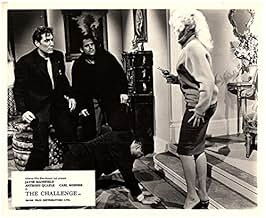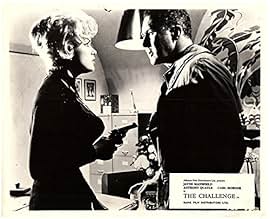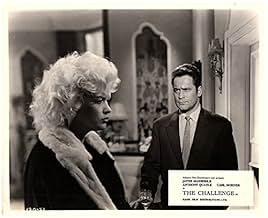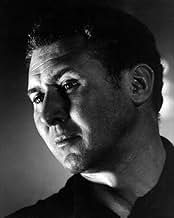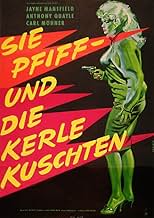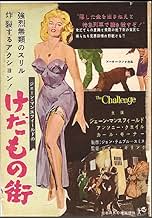A gang leader dumps her criminal boyfriend when he is convicted of robbery, but he recovers the stolen loot once he's released. In retaliation, the gang kidnaps his son and demands the money... Read allA gang leader dumps her criminal boyfriend when he is convicted of robbery, but he recovers the stolen loot once he's released. In retaliation, the gang kidnaps his son and demands the money as ransom.A gang leader dumps her criminal boyfriend when he is convicted of robbery, but he recovers the stolen loot once he's released. In retaliation, the gang kidnaps his son and demands the money as ransom.
Featured reviews
Aka..."The Challenge"
Exceptional Psychological and Physical Violence Permeate this Picture from Britain.
Cutting-Edge Presentation of Child in Peril, Violence to Women, and Abnormal Psychology Wrap Around a Good Jayne Mansfield Performance.
The Film also Offers Thrills Filmed with Dutch Angles and Tight-Tension Scenarios with Nail-Biting Brutality and High-Speed Chases.
Anthony Quayle Gives a Solid, Grim Outing as a Gang-Member who Does Time and is Released only to Find His Gang Turns on Him for the "Buried Treasure".
They Not Only Turn on Him but His 6 Year Old Son and His Aging Mom.
The Film Contains some of the Most Gut-Wrenching Violence Seen on the Screen Before the Code Broke Down.
It's a Fantastic Gang-Land Crime Thriller that is Virtually Unknown and Deserves more Attention and Praise.
Jayne, Quayle, and Director Gillian Made this an Atypical "Times-are-Changing" Introduction, to the Turbulent, Paradigm Shattering Decade.
A Hidden Gem.
Exceptional Psychological and Physical Violence Permeate this Picture from Britain.
Cutting-Edge Presentation of Child in Peril, Violence to Women, and Abnormal Psychology Wrap Around a Good Jayne Mansfield Performance.
The Film also Offers Thrills Filmed with Dutch Angles and Tight-Tension Scenarios with Nail-Biting Brutality and High-Speed Chases.
Anthony Quayle Gives a Solid, Grim Outing as a Gang-Member who Does Time and is Released only to Find His Gang Turns on Him for the "Buried Treasure".
They Not Only Turn on Him but His 6 Year Old Son and His Aging Mom.
The Film Contains some of the Most Gut-Wrenching Violence Seen on the Screen Before the Code Broke Down.
It's a Fantastic Gang-Land Crime Thriller that is Virtually Unknown and Deserves more Attention and Praise.
Jayne, Quayle, and Director Gillian Made this an Atypical "Times-are-Changing" Introduction, to the Turbulent, Paradigm Shattering Decade.
A Hidden Gem.
If someone else played Billy instead of Jayne Mansfield it could've been better. Lots of good characters actors here to keep it going and quite violent considering. Anthony Quayle was as good as usual.
This film contains a surprisingly high level of violence; in particular the kidnapping scene where the boy's grandmother is beaten up. Even nowadays when gory violence seems to be the norm, it mainly happens to men and I think most film producers would hesitate before depicting a helpless old lady being beaten senseless in prolonged and graphic detail, in this case made more realistic and believable by good acting from Barbara Mullen.
The same thug who beat her is later arrested in his bedroom by the police sending in a dog followed by three heavies who give him a savage beating before driving him to the station where he is threatened with more unless he gives the location of the boy.
Whether her acting is good or bad the producers probably wanted Jayne Mansfield as added glamour which she provides by looking stunning particularly towards the end when she sings in her club.
Overall this is an exciting and entertaining thriller.
There are many really good British noir films that exploit the seediness of post-war London, set around Soho and involving realistic underground criminality and making very watchable drama out of 1950's London low-life.
But this isn't that kind of film.
For some reason, the producers decided to make a Hollywood type noir - ignoring the excellent genre work done by other British producers and creating a totally unbelievable poor-mans version of a movie that should have had Bogart and Raft in it but instead had a collection of totally out-of-place British actors - and - Jayne Mansfield.
Mansfield whispers - Marilyn Monroe style - her way through the part and it is obvious that her attempt at a sultry voice has to be overdubbed for many of her scenes. The rest of the cast try their best to be American gangsters (at one point Anthony Quayle actually calls somebody a "dirty-rat") and betray their true acting ability in a poor attempt to be something they aren't.
The cinematography is good - lots of moody lighting, clever angles and the direction is sharp, closely cut with some good set scenes. But you always feel that this is a British attempt at making a film that is totally un-British.
The film gets better as it progresses as the story takes over and Quayle's excellent performance lifts the film out of its misery into something that is finally worth watching. But you always feel that Quayle is on a damage reduction exercise trying his best to rescue the awful script and Mansfield's execrable acting and try and create something worthwhile. Regrettably, the forces of mediocrity win out.
But this isn't that kind of film.
For some reason, the producers decided to make a Hollywood type noir - ignoring the excellent genre work done by other British producers and creating a totally unbelievable poor-mans version of a movie that should have had Bogart and Raft in it but instead had a collection of totally out-of-place British actors - and - Jayne Mansfield.
Mansfield whispers - Marilyn Monroe style - her way through the part and it is obvious that her attempt at a sultry voice has to be overdubbed for many of her scenes. The rest of the cast try their best to be American gangsters (at one point Anthony Quayle actually calls somebody a "dirty-rat") and betray their true acting ability in a poor attempt to be something they aren't.
The cinematography is good - lots of moody lighting, clever angles and the direction is sharp, closely cut with some good set scenes. But you always feel that this is a British attempt at making a film that is totally un-British.
The film gets better as it progresses as the story takes over and Quayle's excellent performance lifts the film out of its misery into something that is finally worth watching. But you always feel that Quayle is on a damage reduction exercise trying his best to rescue the awful script and Mansfield's execrable acting and try and create something worthwhile. Regrettably, the forces of mediocrity win out.
It is sometimes said that the age of film noir was over by the end of the fifties; Orson Welles's "Touch of Evil" from 1958 is sometimes regarded as marking the end of the line. This may be true of America, the genre's original home, but in Britain noir survived into the sixties. This may be because we were slower than America to adopt colour television, meaning that there was still a market for black-and-white films here. "The Challenge" from 1960 is an example of later British noir. (In America it was shown as "It Takes a Thief", but I will use the original British title).
Jim Maxton, a lorry driver and petty criminal, is persuaded by his gang leader lover Billy to take part in a big robbery. (And no, this isn't a rare example of a film from the early sixties with a gay theme. Although the cast-list spells her name as "Billy" rather than "Billie", she is a woman). He is betrayed to the police, arrested, convicted and sentenced to eight years in jail, of which he serves five, while the rest of the gang remain at liberty. Upon release, Maxton tries to go straight and resumes his career as a lorry driver, but it turns out that he is the only one of the gang who knows where the loot from the robbery is buried. In an attempt to force him to reveal its whereabouts, his former partners in crime kidnap his young son Joey and threaten the boy's life.
Contrary to what one reviewer states, Jayne Mansfield was not a starlet at the start of her career when she made this film. Her career as a Hollywood leading lady was a relatively short one, largely because she was seen as a sort of poor man's Marilyn Monroe. She was not without acting talent, but producers preferred to cast her in undemanding roles in light comedies which showcased her voluptuous figure. (Something similar happened with Diana Dors in Britain). By 1960 her popularity in America was waning, and she tried to reinvent herself in Europe. This was her only British film, but she was also to appear in Italian, German and Greek ones.
Mansfield is not particularly convincing as a female London gang boss, especially as her accent seems stuck halfway across the Atlantic, and we are never sure whether Billy is supposed to be completely ruthless or whether she is partly redeemed by a softer side to her nature. There are better performances from the actors playing two other members of the gang, Carl Möhner as Kristy and Peter Reynolds as Buddy. Kristy, who definitely has no softer side to his nature, is Maxton's rival for Billy's affections and probably the man who informed on Maxton to the police. As for Buddy he is not so much ruthless as psychopathic; he has responsibility for guarding the kidnapped Joey and devises a sadistic scheme to bring about the boy's death and make it look like an accident.
The best acting, however, comes from Anthony Quayle as Maxton. Quayle was a leading light in the British theatre, both as actor and director, but never had quite the same success in the cinema, possibly because (unlike, say, Olivier or Burton) he never really had the looks to be a matinee idol. Most of his films were British- he never attempted to conquer Hollywood- and he mostly appeared in supporting roles. In "The Challenge", however, he had a chance to play a leading role, and made the most of it. His Maxton, despite his criminal past, is a man with a certain decency, far more so than the other members of his gang, and the nearest thing the film has to a hero. In some ways the film is a standard crime thriller, but Quayle's performance, together with a well-written script and a suspenseful ending, is the main reason why it deserves an above-average mark. 6/10.
Jim Maxton, a lorry driver and petty criminal, is persuaded by his gang leader lover Billy to take part in a big robbery. (And no, this isn't a rare example of a film from the early sixties with a gay theme. Although the cast-list spells her name as "Billy" rather than "Billie", she is a woman). He is betrayed to the police, arrested, convicted and sentenced to eight years in jail, of which he serves five, while the rest of the gang remain at liberty. Upon release, Maxton tries to go straight and resumes his career as a lorry driver, but it turns out that he is the only one of the gang who knows where the loot from the robbery is buried. In an attempt to force him to reveal its whereabouts, his former partners in crime kidnap his young son Joey and threaten the boy's life.
Contrary to what one reviewer states, Jayne Mansfield was not a starlet at the start of her career when she made this film. Her career as a Hollywood leading lady was a relatively short one, largely because she was seen as a sort of poor man's Marilyn Monroe. She was not without acting talent, but producers preferred to cast her in undemanding roles in light comedies which showcased her voluptuous figure. (Something similar happened with Diana Dors in Britain). By 1960 her popularity in America was waning, and she tried to reinvent herself in Europe. This was her only British film, but she was also to appear in Italian, German and Greek ones.
Mansfield is not particularly convincing as a female London gang boss, especially as her accent seems stuck halfway across the Atlantic, and we are never sure whether Billy is supposed to be completely ruthless or whether she is partly redeemed by a softer side to her nature. There are better performances from the actors playing two other members of the gang, Carl Möhner as Kristy and Peter Reynolds as Buddy. Kristy, who definitely has no softer side to his nature, is Maxton's rival for Billy's affections and probably the man who informed on Maxton to the police. As for Buddy he is not so much ruthless as psychopathic; he has responsibility for guarding the kidnapped Joey and devises a sadistic scheme to bring about the boy's death and make it look like an accident.
The best acting, however, comes from Anthony Quayle as Maxton. Quayle was a leading light in the British theatre, both as actor and director, but never had quite the same success in the cinema, possibly because (unlike, say, Olivier or Burton) he never really had the looks to be a matinee idol. Most of his films were British- he never attempted to conquer Hollywood- and he mostly appeared in supporting roles. In "The Challenge", however, he had a chance to play a leading role, and made the most of it. His Maxton, despite his criminal past, is a man with a certain decency, far more so than the other members of his gang, and the nearest thing the film has to a hero. In some ways the film is a standard crime thriller, but Quayle's performance, together with a well-written script and a suspenseful ending, is the main reason why it deserves an above-average mark. 6/10.
Did you know
- TriviaThe train set bought for Joey has the name Rovex on the box. This was a name used by the Triang company which manufactured OO scale model railways. However, the actual train set in the movie appears to be a much larger Hornby O scale set.
- GoofsIt is never explained why the lorry drivers decide to attack Jim and tie him up rather than help him to retrieve the loot.
- ConnectionsFeatured in Neil Sean Meets...: Stars & Friends of Jayne Mansfield (2015)
- SoundtracksThe Challenge
Lyrics by Robert Halfin
Music by Bill McGuffie (as William McGuffie)
Performed by Jayne Mansfield (dubbed by Joan Small) (uncredited)
- How long is It Takes a Thief?Powered by Alexa
Details
- Runtime1 hour 41 minutes
- Color
- Aspect ratio
- 1.37 : 1
Contribute to this page
Suggest an edit or add missing content


